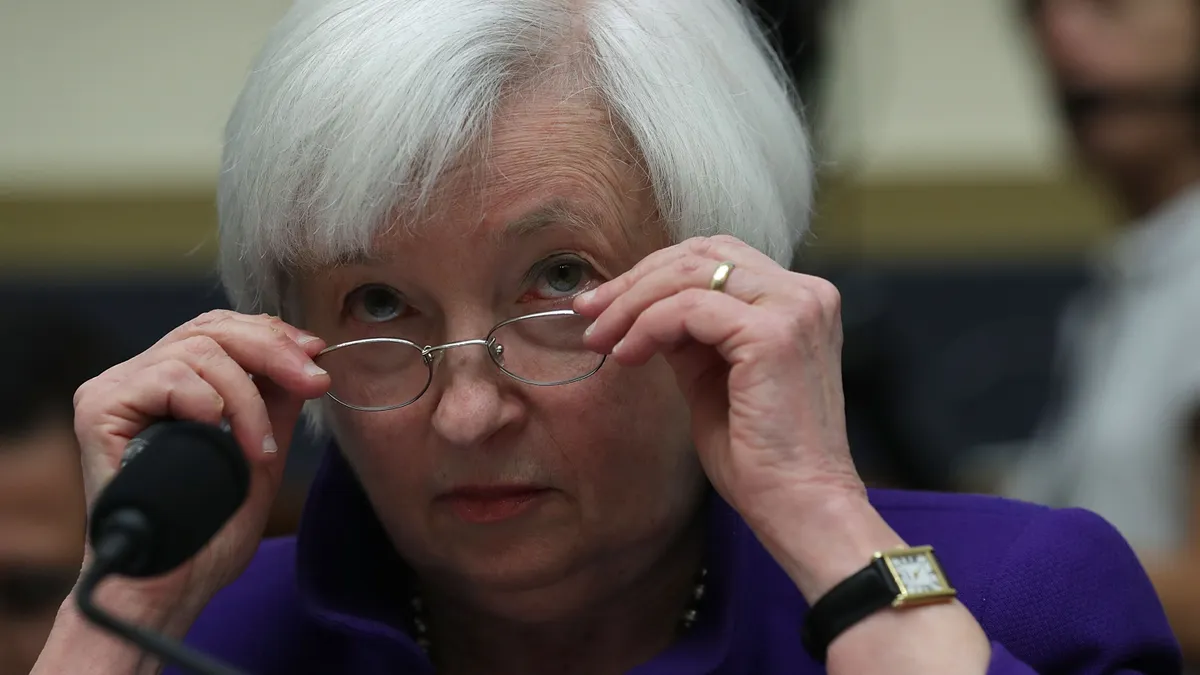Dive Brief:
-
U.S. Treasury Secretary Janet Yellen called on developed countries to press on with record monetary and fiscal stimulus, citing the costs from withdrawing support to the economy too early during the 2008-2009 financial crisis.
-
“We are going to be careful to learn the lessons of the financial crisis, which is don't withdraw support too quickly, and we would encourage all those developed countries that have the capacity, using fiscal policy and monetary policy, to continue to support a global recovery,” Yellen said Tuesday at the opening of meetings by the World Bank and International Monetary Fund (IMF).
-
Yellen spoke soon after the IMF in its World Economic Outlook urged policymakers to stand ready to avert any flare-up in financial instability sparked by record leverage in the non-financial sector worldwide.
Dive Insight:
Yellen has been a leading champion for the Biden administration's efforts to revive the pandemic-stricken U.S. economy through record fiscal stimulus. She promoted $1.9 trillion in pandemic relief that the Democrats pushed through Congress in March and is trying to build support behind more than $2 trillion in infrastructure spending proposed by Biden last week.
“We've decided to go big, because we think that the risks are of severe scarring if we allow there to be long-term unemployment,” Yellen said.
For its part, the Federal Reserve has held down borrowing costs for more than a year by keeping the benchmark interest rate at a record low and buying $120 billion bonds every month.
Before Yellen spoke, the IMF warned easy credit poses a threat to financial market instability, and called on policymakers to be prepared to snuff out any market turmoil.
Leverage in the non-financial sector worldwide hit a historic high at the end of 2019, fueled largely by record financial stimulus following the financial crisis, the IMF said.
Since the onset of the coronavirus, companies and households have become even more reliant on debt, the IMF said. The pandemic compelled central banks to increase accommodation to ensure adequate credit to companies and households and halt a plunge in global demand.
Global non-financial corporate and household debt rose the equivalent of 11.5 percentage points and 5 percentage points of gross domestic product, respectively, from the end of 2019 until the third quarter of 2020, the IMF said.
“Rising leverage could increase risks to financial stability and pose a challenge to policymakers once the post-COVID-19 recovery takes root,” the IMF said in its Global Financial Stability report.
“Policymakers need to remain vigilant to the risks of high leverage and be well aware of the need to reduce those risks, including through well-designed policies to deal with highly indebted firms, greater supervisory attention to risk taking and the swift implementation of macroprudential tightening as soon as macroeconomic conditions permit,” the IMF said.
Market stability hinges, to a degree, on banks' willingness to sustain lending as the global expansion unfolds, the IMF said. The U.S. economy will grow 6.4% this year after shrinking 3.5% in 2020, and world growth will rebound to 6% from a 3.3% contraction last year, the IMF said in new forecasts released Tuesday.
“Whether the economic recovery will be uneven and whether it will suffer from scarring effects will depend on the ability and willingness of banks to lend once support is unwound by the governments,” Tobias Adrian, director of the IMF’s monetary and capital markets department, said.
“Concerns about the credit quality of borrowers and about profitability outlook are likely to weigh on the risk appetite of banks,” Adrian said at a briefing on Tuesday. “Even if most banks have ample capital buffers, only a few may be willing to use the buffers to lend and support the recovery.”














